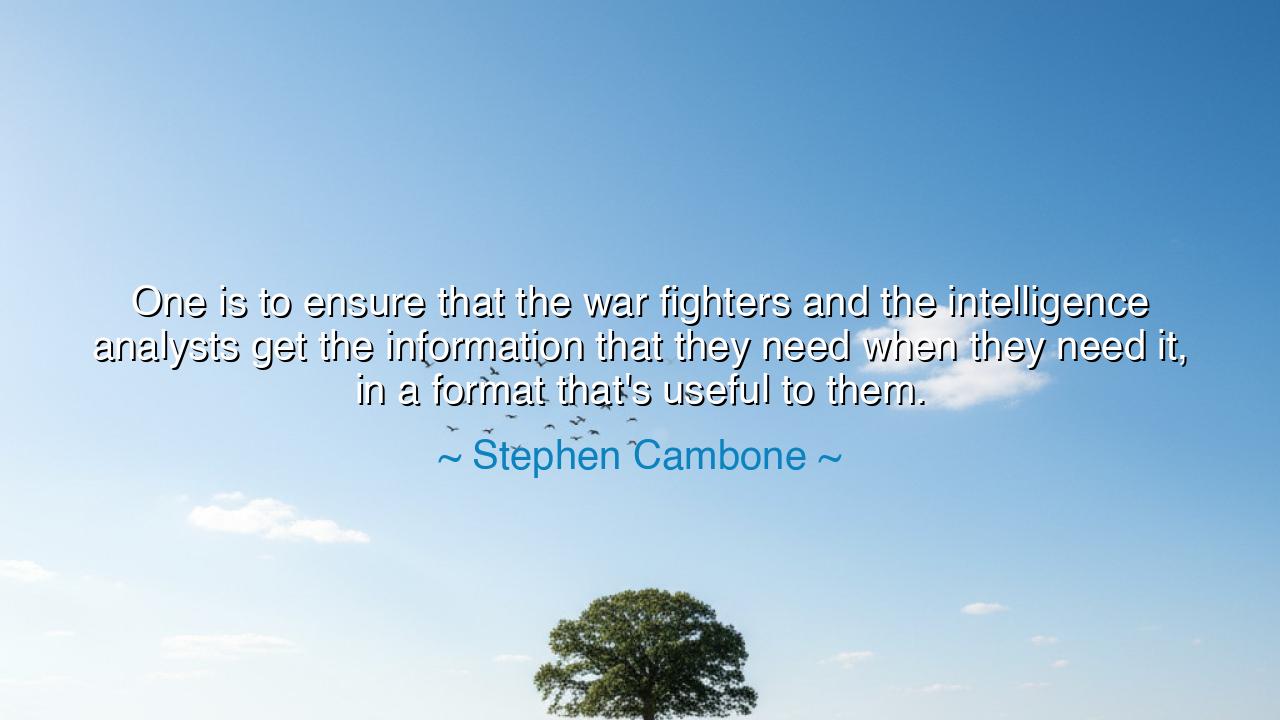
One is to ensure that the war fighters and the intelligence
One is to ensure that the war fighters and the intelligence analysts get the information that they need when they need it, in a format that's useful to them.






In the annals of war and strategy, few principles are as timeless as the need for knowledge and timely action. Stephen Cambone’s words, “One is to ensure that the war fighters and the intelligence analysts get the information that they need when they need it, in a format that's useful to them,” speak directly to the heart of this age-old truth. Information, in the heat of battle, is not a luxury but a weapon—one that must be wielded with precision, clarity, and speed. The war fighters, those on the front lines, and the intelligence analysts, the unseen minds that process and decipher, both rely on the swift flow of knowledge to make decisions that will determine the course of history. Without this, the battle is lost before it even begins.
From the dawn of civilization, the great generals and leaders understood that the flow of information could turn the tide of a battle. Sun Tzu, in his Art of War, wrote that “All warfare is based on deception.” But deception cannot succeed without timely, accurate, and actionable intelligence. In ancient times, the general relied on scouts, messengers, and spies to deliver the information that would shape his strategies. But in the chaos of war, even the most valuable information is useless if it does not reach the right hands at the right moment. Cambone’s words remind us that speed and clarity are as essential as the information itself. For just as a general might have the best army, if that army does not know where to strike, or when to strike, victory slips through their fingers.
Hannibal, the Carthaginian general, offers a brilliant example of the importance of timely intelligence. In his famous crossing of the Alps to invade Rome, he was able to surprise the Romans, not by overwhelming them with brute force, but by using accurate intelligence to exploit their weaknesses. His spies and scouts delivered the information he needed to choose the perfect moment to strike. However, had he received faulty intelligence, or had that intelligence come too late, his victory would have been impossible. Like Hannibal, modern war fighters and intelligence analysts rely on the same principle—information that is timely, precise, and delivered in the right format. Without it, the war is not won.
This is the lesson Cambone imparts—that the communication between those who fight the battle and those who analyze the terrain must be seamless. Just as the heart and mind must work together in a human body, so too must the war fighter and the analyst. The body may be strong, but without the mind’s guidance, it stumbles blindly. Similarly, the mind may be sharp, but without the body to carry out its commands, it falters. In the same vein, an army without knowledge is a ship adrift at sea, lost in a storm of uncertainty. The greatest military minds of history, from Alexander the Great to Napoleon, all understood that victory came not through force alone, but through the intelligent use of information. Cambone’s insight applies not only to war but to every endeavor where action depends on knowledge.
Cambone’s words resonate deeply in the modern world, where information flows freely but often in confusing torrents. In the digital age, there is no shortage of data, but the challenge lies in ensuring that this data is distilled into actionable intelligence. The analysts must be able to filter through the noise to extract the truths that will guide decisions. The war fighters, in turn, must receive that information at the moment it will do the most good—before the enemy has time to act, or the opportunity slips away. In today’s world, much like in the ancient past, the timeliness and clarity of information can make the difference between life and death, between victory and defeat.
The practical lesson here is clear: action and intelligence must be aligned in time and form. In your own life, whether you are making decisions in business, relationships, or personal endeavors, ask yourself: Do I have the information I need, and am I using it at the right moment? Knowledge is power, but only when it is acted upon swiftly and wisely. Like the war fighter and the analyst, we too must ensure that we are not overwhelmed by the sheer volume of information that surrounds us but are instead focused on what is relevant and useful.
In the end, victory in any arena—whether in war, business, or life—is determined by the clarity of the information you have, the speed with which you act on it, and the wisdom to understand how it fits into the broader picture. Just as Cambone suggests, we must ensure that the right people have the right information at the right time, in a form that empowers them to make the best decisions. This is the path to success, whether on the battlefield or in the world of today. Knowledge, when properly used, is not just a weapon—it is the key to unlocking the future.






AAdministratorAdministrator
Welcome, honored guests. Please leave a comment, we will respond soon